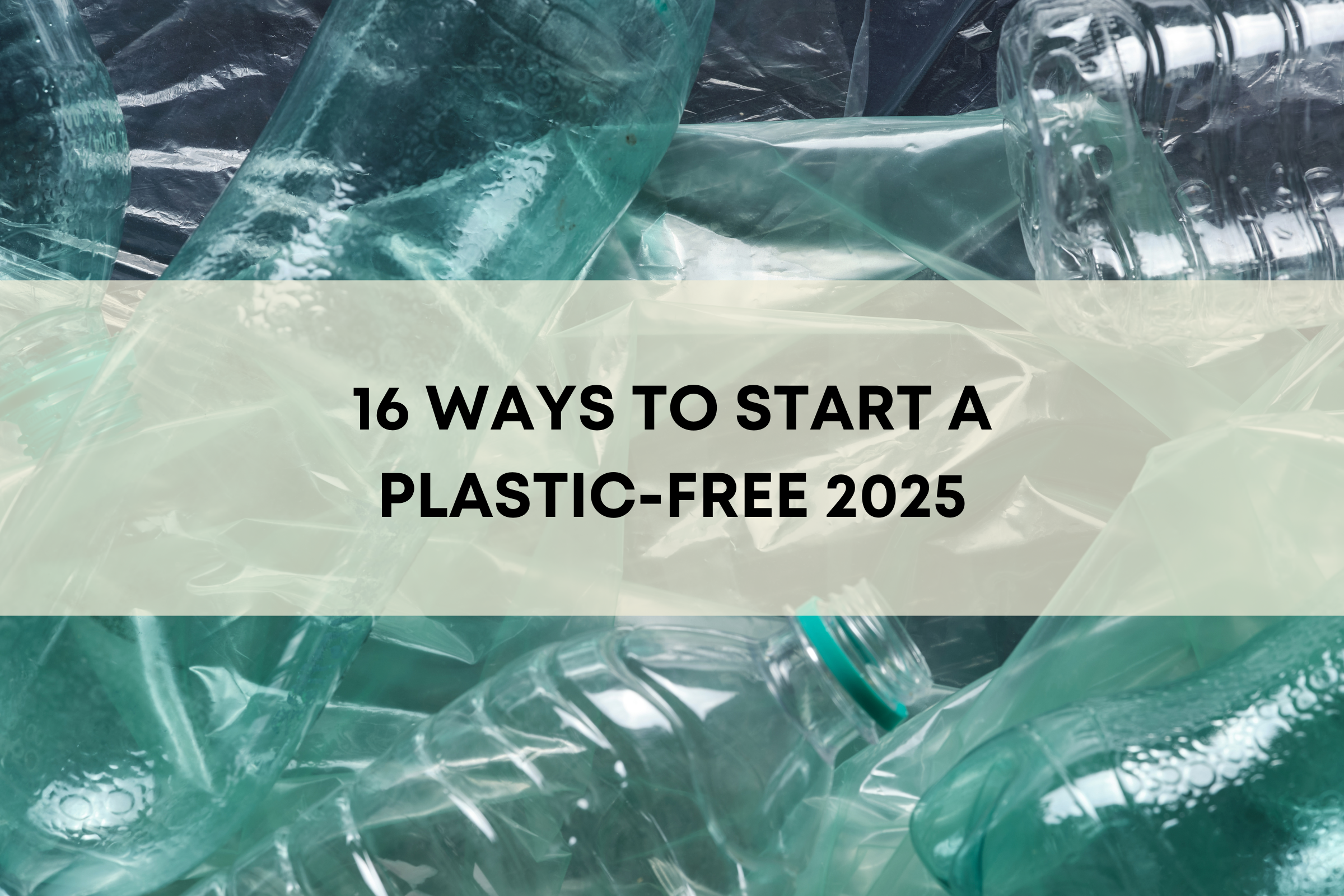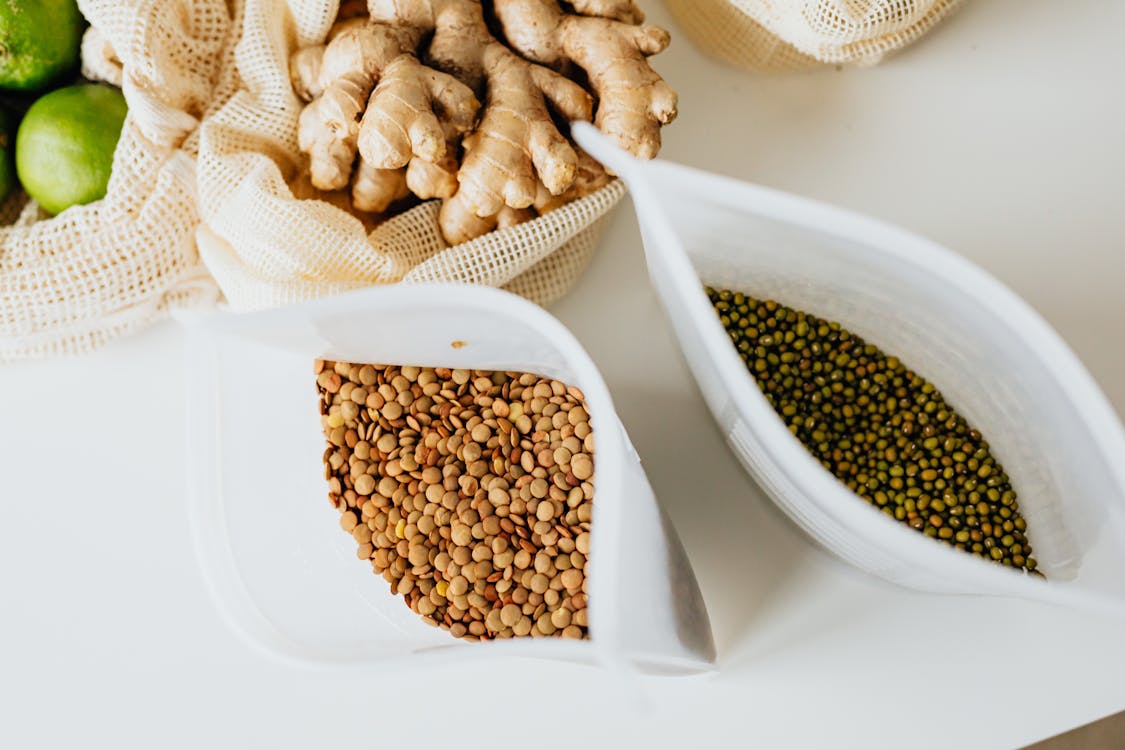16 Ways to Start a Plastic-Free 2025

Plastics can be a hassle – they create clutter and can be confusing to recycle – plus they contribute to litter, harm water and wildlife, and have largely unknown health impacts for us. Fortunately, there’s a lot we can do to help create a plastic-free world, from learning more about plastic waste and recycling to making simple swaps to advocating for changes in your community and sharing your story with others.
The New Year is a great time to start fresh, but it doesn’t have to be overwhelming. New Year’s Resolutions do not have to be grand or some huge accomplishment. We’re true believers here at Tare Market that small steps can make a huge difference. January is the perfect time to begin a plastic-free lifestyle as you head into the year and set your habits.
Plastic pollution is becoming a huge problem for our planet. Having only been discovered in 1907, it has created generations of waste that we cannot handle, and it’s affecting our lives in many more ways than we can imagine. Here are the scary facts of plastic use:
-
Half of the plastic produced is single-use plastic, which means it’s used once and thrown away.
-
Humans create 400 million tons of plastic waste each year
-
32% of this plastic waste enters the ocean, affecting marine life, the environment, and more.
-
As a synthetic, plastic is quick to produce but can take hundreds and sometimes even thousands of years to break down. But what’s worse, when plastic breaks down, it’s creating micro and nanoplastics, which are persisting in the environment and are even starting to be found in the human body.
It’s a problem, and many people are starting to realize it the more research comes out to show the detrimental effect it is having on our planet, communities, and even our health.
So, we’ve compiled the ultimate list of ways you can begin your New Year on the right foot — a plastic-free one! Wherever you are at in your zero-waste journey, we’re passionate about supporting you on it and providing you with the resources to do so! Remember, you don’t have to do all of this, but each action is a step in the right direction and makes a big difference! Let’s get started.
Plastic 101
-
Learn the numbers
There are 7 types of plastic all labeled with the recycling symbol and a number. Although these bear the recycling symbol, not all plastics are recyclable in all community recycling programs, and sometimes there are restrictions as well on the color of the plastic.
It’s important to learn the plastic numbers, what they each are, and what you can recycle directly in your curbside recycling collection and community recycling programs to limit as much plastic going to the landfill as possible.
Read up on the types of plastic here. -
Complete a trash audit
Before we can reduce our waste, we have to face it. Conducting a trash audit will help you gain awareness of what you are sending to the landfill and identify areas of your life that are producing the most waste. Download our FREE E-Book here on How to Conduct a Trash Audit. -
Learn what your curbside recycling accepts!
Each city is different in what they accept for recycling. It’s important to learn what is and isn’t accepted to reduce ‘wishcycling’, which not only contaminates the recycling streams but can be dangerous for employees who need to retrieve non-recyclable items from machinery. Take action now and look up your county recycling program, print out what is accepted, and keep it closeby your recycling bin for reminders. -
Research and Learn!
There are many informative documentaries and shows highlighting the plastic waste epidemic we are experiencing and the impact it has on our planet. However you learn — by reading, watching or doing, here are some resources to explore:-
Reading: If you are local to Tare Market, we have a great Book Borrowing Library with a variety of books on the zero waste lifestyle that you can borrow & read at any time. Below are a few books we’d highly recommend:

How to Give Up Plastic: A Guide to Changing the World, One Plastic Bottle At A Time by Will Mcallum 
The Zero-Waste Chef: Plant-Forward Recipes and Tips for a Sustainable Kitchen and Planet: A Cookbook

Zero Waste Home: The Ultimate Guide to Simplifying Your Life by Reducing Your Waste by Bea Johnson
-
Watching:
-
At Home
Look at the plastic items you use around your home and think of ways you can avoid purchasing them. Reduce or repurpose what you can and properly recycle plastics you cannot avoid. There are many plastic-free swaps you can make for everyday items in your home that are not only more effective, but better for you.
-
Make your own green cleaners
Many cleaning products on the market currently contain hundreds of hazardous chemicals that can harm human health & the environment. According to the Environmental Working Group (EWG), 53% of cleaning products contain ingredients that can harm the lungs, and 22% contain chemicals that can cause asthma.
You can easily make your own cleaning sprays and swap conventional cleaning supplies for natural, zero-waste, and safe alternatives and we’re happy to be able to carry & offer those to you.
Visit our Green Cleaning for Fall Blog here for some of our own recipes for highly effective, and all-natural cleaning sprays! -
Choose natural clothing fibers
One of the major culprits of microplastics are synthetic fibers like polyester, nylon, acrylic and spandex. Not only do these produce microplastics in production, but as you wash and dry these, it sheds even more that not only contaminate the water, your trash through the lint, but also the air in your home.
Consider checking care labels and choosing only natural fibers like cotton, linen and wool. -
Buy Used!
Buying secondhand, or swapping with friends/family is an incredibly good way to reduce plastic use as it reduces the demand for new plastic products to be made, and avoids additional plastic packaging.
Explore local marketplaces, closet swaps, and Buy Nothing groups in your area. You will be surprised at what you can find practically new and unused! -
Ditch your sponge
One of the easiest swaps you can make in your kitchen is to swap your sponge for a natural option. Did you know that traditional sponges are made of plastic? This means that they are not biodegradable and break down into microplastics. What’s worse, because plastic sponges can be germ ridden and frequently need replacement, it’s estimated that in the U.S. alone, we throw away an estimated 500 million plastic sponges per year!
Natural options like this Eco Sponge are safer to use, and can be composted at the end of its life.

Food
-
Buy Unpackaged Produce
Skip the plastic bag and shop produce not wrapped or packed in plastic. Not only is this better for you, but you’re reducing the plastic packaging entering the waste stream as flimsy plastics and plastic bags are typically not universally accepted in recycling programs.
A great way to do this is to shop at Farmers Markets, where you can bring your own reusable totes, veggie bags, to fill up. -
Shop the Bulk Bins
Consider shopping bulk instead! The beauty of this is that you only buy what you need. Only need a cup of flour? Or maybe just 2 tbsp of honey? Shopping bulk is a great way to cut down on packaging and plastic waste, but also to reduce food waste.
Want to find a zero waste store with bulk offerings near you? Check out Litterless for a full list of bulk shops across the US. -
Ditch the Plastic Wrap
Plastic cling wrap is not recyclable and it’s incredibly wasteful. There are many other alternatives that make great swaps like bees wax wraps, using reusable glass or silicone containers, silicone covers, and more. -
Grow your own
Growing your own garden is an incredible way to reduce plastic waste! Planning and starting your own garden gives you the freedom to grow what you will eat, and harvest when you need it.
On the go
Busy lifestyles can lead to a lot of plastic waste for the convenience, but it doesn’t have to be that way!
-
Use Reusable Water Bottles
Plastic bottles are amongst one of the top 5 plastic products that make up the most ocean waste. Plastic bottles are also a major producer of microplastics as the water is packaged, transported, heated and in unknown conditions, and as the bottle is crushed/deformed in transit, which you are directly consuming from the water bottle.
Bring a reusable water bottle wherever you go that you can refill with filtered water and keep a plastic bottle from the landfill. -
Use A Reusable Mug or Cup
Although coffee cups may have a recycling symbol, they actually are NOT recyclable because they have a plastic film layer to waterproof the interior. So, opt to bring your own mug or reusable cup to your coffee shop. Majority of the time, coffee shops have a small discount when you bring in a reusable mug! -
Use Reusable Totes
This is an easy one! Put reusable totes wherever you may need it — by your front and side doors, in your car, in your backpack, in your bag even! It’s easy to forget to bring these but using a reusable tote goes a long way to keep flimsy plastic bags out of the landfill, ocean, and environment, where it can cause harm to wildlife. -
Bring Reusables
Wherever you may be, it never hurts to keep some reusable containers with you. When eating out, use your own containers to pack leftovers to bring home instead of opting for the restaurant’s to-go containers.
There are many more areas in your life where you can make changes to become plastic-free. It all starts with little steps, and these are the more common & easier areas and actions to take.
If you are local to Twin Cities, the Plastic-Free Challenge takes place every February and is an incredible way for those on the zero waste journey to take the steps towards a plastic-free lifestyle, and join a community of people making the same impact. It’s a great idea to do some research if your local community does anything like this too! There are many online challenges like this one that are important and make a huge difference for communities.
Here at Tare Market, we’ve curated a selection of over 700 plastic- and package-free goods that are fully vetted & researched to ensure they are not only safe and nontoxic but that they are ethically made as well. Many of our products are also locally sourced, or made by small businesses that are BIPOC or women-owned.
If you’re interested in making some plastic-free swaps in your life to start your 2025, we have created our Plastic-Free New Year collection, which houses some of our top recommendations for easy swaps in your home.
Recent Blog Posts
Discover more tips on living #ZeroWaste!
-

Why Choose a Plastic-Free, Zero-Waste Lifestyle?
Plastic waste is everywhere, but small swaps can make a big impact. Reduce single-use plastic, shop in bulk, and choose sustainable alternatives. Tare Market is here to help you...
Read more -

Celebrating Women Makers: Women-Owned Brands at Tare Market
Celebrate International Women’s Day with Tare Market by supporting women-owned brands that are making a difference in sustainability and entrepreneurship. From eco-friendly clea...
Read more -

16 Ways to Start a Plastic-Free 2025
Kick off your New Year with a fresh start toward a plastic-free lifestyle! From simple swaps to learning about recycling and reducing waste, Tare Market is here to help you make...
Read more



